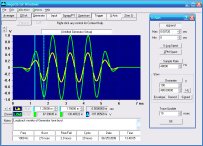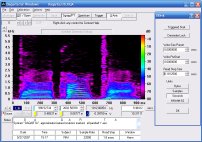![[LogoShip]](logo5.png)
Software for Windows
Science with your Sound Card!


Features:
Oscilloscope
Spectrum Analyzer
8-Channel
Signal Generator
(Absolutely FREE!)
Spectrogram
Pitch Tracker
Pitch-to-MIDI
DaqMusiq Generator
(Free Music... Forever!)
Engine Simulator
LCR Meter
Remote Operation
DC Measurements
True RMS Voltmeter
Sound Level Meter
Frequency Counter
Period
Event
Spectral Event
Temperature
Pressure
MHz Frequencies
Data Logger
Waveform Averager
Histogram
Post-Stimulus Time
Histogram (PSTH)
THD Meter
IMD Meter
Precision Phase Meter
Pulse Meter
Macro System
Multi-Trace Arrays
Trigger Controls
Auto-Calibration
Spectral Peak Track
Spectrum Limit Testing
Direct-to-Disk Recording
Accessibility
Data Logger
Waveform Averager
Histogram
Post-Stimulus Time
Histogram (PSTH)
THD Meter
IMD Meter
Precision Phase Meter
Pulse Meter
Macro System
Multi-Trace Arrays
Trigger Controls
Auto-Calibration
Spectral Peak Track
Spectrum Limit Testing
Direct-to-Disk Recording
Accessibility
Applications:
Frequency response
Distortion measurement
Speech and music
Microphone calibration
Loudspeaker test
Auditory phenomena
Musical instrument tuning
Animal sound
Evoked potentials
Rotating machinery
Automotive
Product test
Contact us about
your application!
Revision History - v7.30
Daqarta v7.30 - 5 April 2013
Contact Us option added to the Help menu, which opens your browser at the Contact page on the Daqarta site.
Manual Check for Updates option added to the Help menu, which opens your browser at the version check page on the Daqarta site and shows your version and the latest version, with links to Free Download and Revision History if different.
Auto-Update Check option added to the Edit Menu - Start Preferences dialog to check silently each time Daqarta starts, and only notify you if there is a newer version.
Posn?U update check macro added to Mouse and Miscellaneous Position Macros to allow creation of custom update checks.
Macro Array buffers Buf0-Buf7 now allow more format options for text file saves, including exponential, scientific, and hexadecimal.
Comparing Noise Distributions Help topic and GausWhit.GEN Generator setup extended to include Gaussian vs. Binary noise comparisons.
New GlossyTracks.DQM MIDI DaqMusiq setup plays over 4 billion unique tracks of adjustable duration, uses list-based random Scale and instrument selection, plus new non-uniform random distributions for Tempo selection for each track.
MIDI expressions now evaluated with 64-bit fixed-point math before assignment. Previously, integer variables used integer math, such that UA=UB/UC*UD did not give the same result as UA=UB*UD/UC.
MIDI expressions now support unary absolute value, such as UA=|UA.
MIDI Changes scripts option added to Help menu.
MIDI Changes script commands for direct access of MIDI buffer values now also support access to main macro array buffers Buf0-Buf7, each with 1024 fixed-point 64-bit values.
New MIDI buffer file load commands allow Changes scripts to load MIDI buffers or macro buffers with lists of values from simple text files. Useful for randomly selecting from a user-defined list of scales, instruments, or random seeds, for example.
MIDI random values now include new uniform options: ?(min,max) rounds limits to integers, as well as the random result. ?f(min,max) maintains full 64-bit fixed-point real resolution for subsequent expression evaluation. Alternative pseudo-random generator ?R(min,max) uses rounded integers, and ?r(min,max) maintains full real resolution.
Non-uniform real MIDI random value distributions now available: ?2(min,max) triangular, ?4() and ?8() semi-Gaussian, ?G() Gaussian, and ?q() square-law. Low-biased or high-biased versions (with the peak at min or max instead of center default) are available by following the type character with 'L' or 'H', as in ?2L(min,max)
MIDI Scale dialog now includes Index readout at bottom which shows the index of the scale currently selected in the Scales List or Custom Scales.
MIDI Scales List now includes 22 chords for use as scales, appearing at the end of the list.
MIDI Changes script Scale set command now includes Si option to select based on index number (see above). Allows random selection from a range of related scales, as in Si1=?(93,95) to select one of 3 Eskimo scales for Voice 1.
MIDI Output Display now allows up to 4 separate displays: the prior Left oL and Right oR, plus new lower left ol and lower right or below them.
Voice Instrument On/Off MIDI script command now allows X9 to appear on the right side of an expression, where it returns the number of active tonal voices.
Similarly, Percussion Instrument On/Off allows XG on the right side of script expression to return the number of active percussion instruments (independent of overall Percussion On/Off state.)
MIDI Changes script command X0=1 now toggles Pitch-to-MIDI off and back on, allowing a performance to restart itself. This allows a setup which uses random parameters on each start to play an unending series of different performances.
Unsigned fixed-point MIDI User Variables Ua-Uz and Qa-Qz now support hexadecimal format for the integer portion, as in Ua=h1234.
For direct access of MIDI Changes script buffers, you can now use carets to separate the index from subsequent terms in an expression, as in UA=Bb12.<196>*UB+UC. Without the carets, the index would be 196*UB+UC.
Bug Fix: Macro variables formatted using exponential or scientific notation for string variable display in macro messages, custom meters, log files, etc, did not display zero properly. Also, integer-only variables such as U0-U9 and UA-UZ did not show specified decimal places in exponential or scientific notation.
Bug Fix: Macro Array (Buf0-Buf7) text file load could skip the initial entry if the previous load ended with a comment.
Bug Fix: Direct set of MIDI buffer values via Changes script did not allow signed integers.
Bug Fix: MIDI Changes Script Expressions did not combine terms properly under certain conditions.
Bug Fix: MIDI computer keyboard Key State read-only variables Ka through Kz could return wrong values under certain conditions.
Bug Fix: MIDI Output Display oLS=n format did not show Custom Scale Name on match, instead showed only equivalent oLs 'CdDeEFgGaAbB' format.
Bug Fix: Right-click on MIDI Custom Scale Selects, Custom Scale Names, or Skip Scale Misses opened the wrong Help topic (or none at all in the latter case).
- Back to Revision History - v7.40
- Ahead to Revision History - v7.20
- Daqarta Help Contents
- Daqarta Help Index
- Daqarta Downloads
- Daqarta Home Page
- Purchase Daqarta
Questions? Comments? Contact us!
We respond to ALL inquiries, typically within 24 hrs.INTERSTELLAR RESEARCH:
Over 35 Years of Innovative Instrumentation
© Copyright 2007 - 2023 by Interstellar Research
All rights reserved